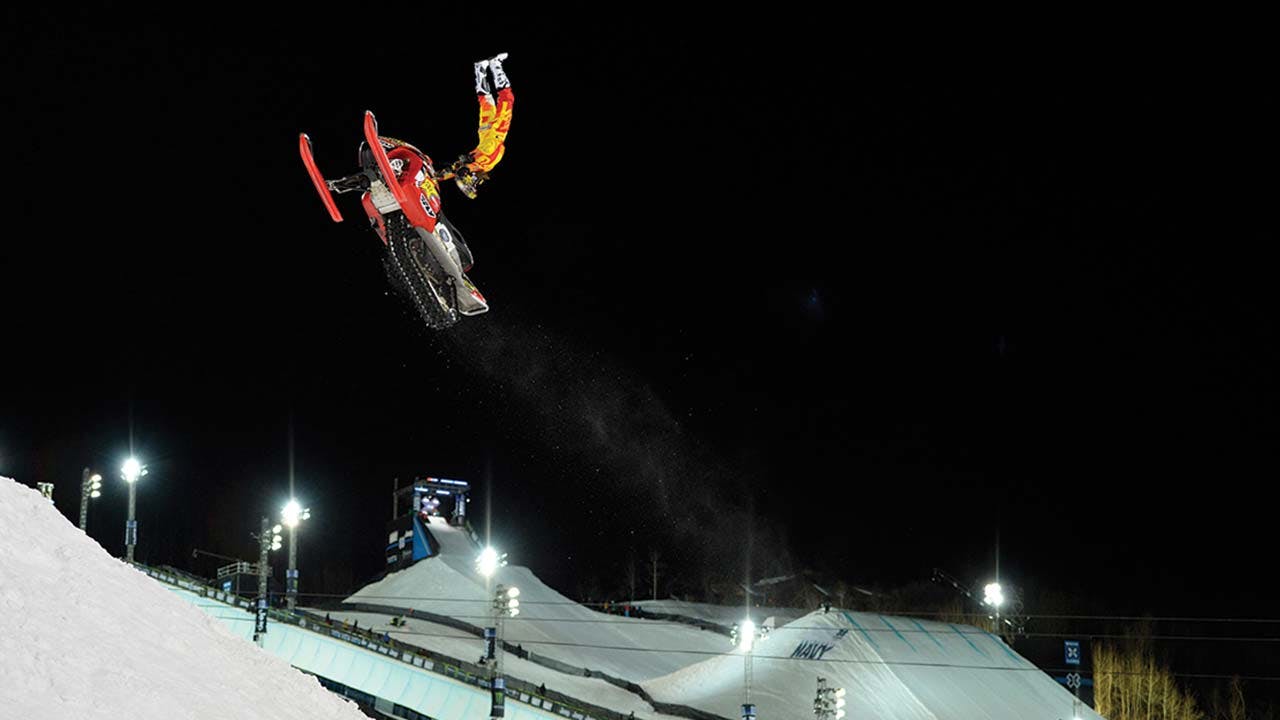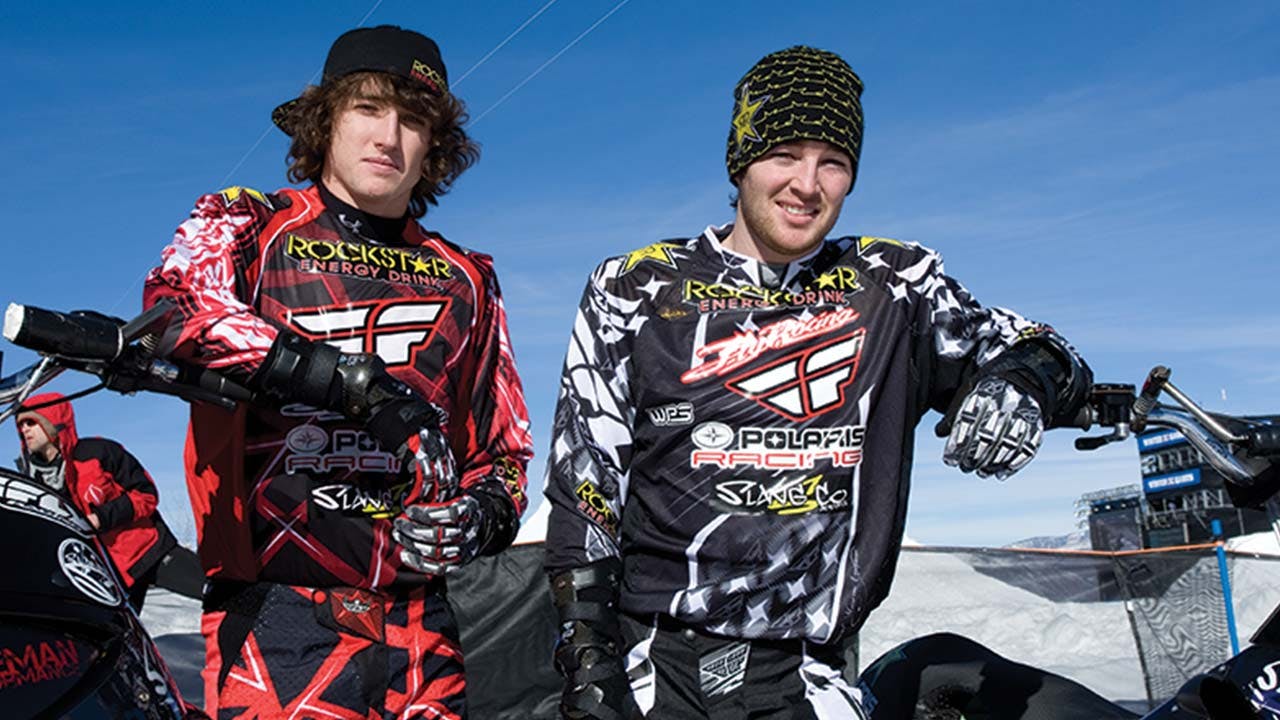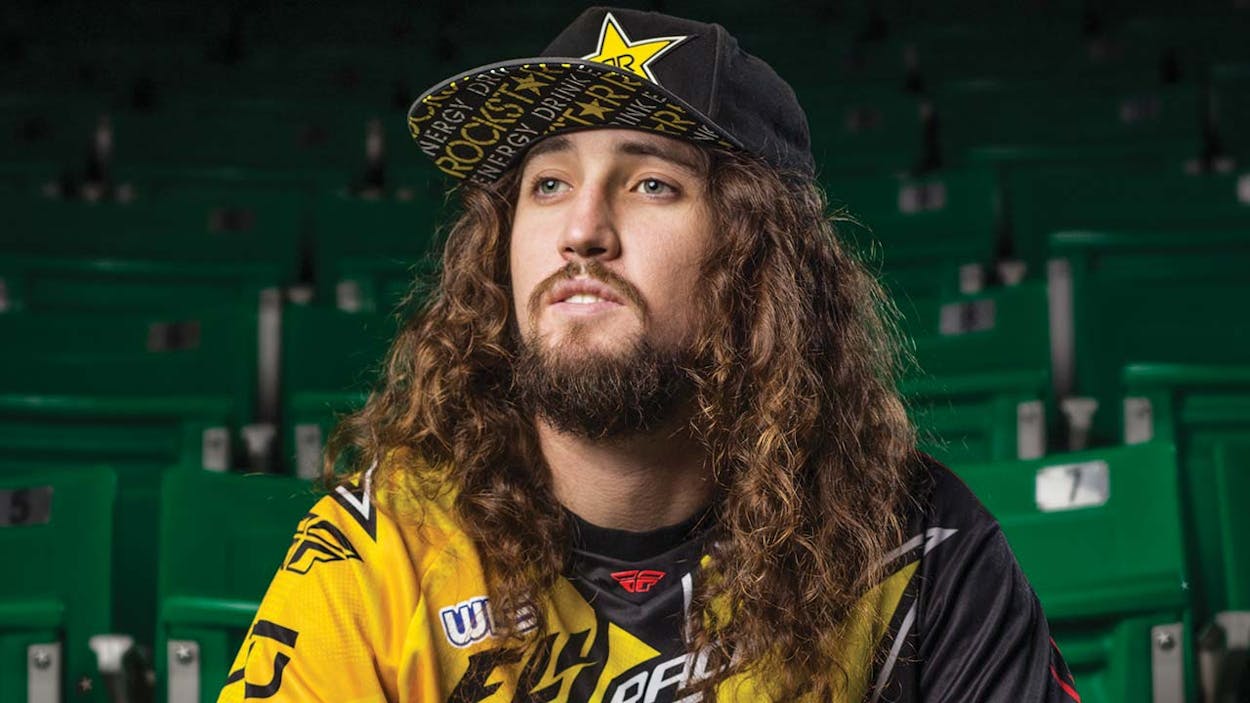Colten Moore and his older brother, Caleb, grew up all across rural Texas, with stops in Clyde, just outside Abilene, and the tiny Panhandle town of Wheeler. In 2010, when they started winning medals at the Winter X Games, the idea of two boys from the Texas Plains jumping snowmobiles on the mountains of Aspen made for an irresistible narrative. But three years later Caleb, who was 25 years old, died after crashing at the X Games, calling Colten’s future into question. This month, Colten, now 26, will compete in Aspen for the seventh time and release the memoir Catching the Sky, in which he writes about his brother and his struggle to keep going.
Paul Knight: I have to be honest, I didn’t realize you were a real Texan.
Colten Moore: Yep. Texas born and raised. I don’t think I’ll ever move away.
PK: In the book, you talk about the harshness of the Panhandle landscape. How did growing up in that environment shape you as a person?
CM: My granddad was a pure Texas country guy. He was a rancher in Wheeler. He didn’t show pain, just fought through the tough stuff and kept working his hardest. You’re taught that when you get bucked off a horse, you have to keep going. We don’t get bucked off a horse; we get bucked off a 450-pound sled. You have to hop up off the ground and keep going. If you can.
PK: You’re known for snowmobiles, but you started out in the dirt, racing four-wheelers.
CM: As soon as we got the quads, that’s all me and my brother wanted to do. We’d sit in school waiting to get out to ride. I wrecked and broke both legs when I was twelve. I remember lying in the hospital and people telling my parents, “You don’t need to let them ride again.” But when we got home, my dad picked me up out of the wheelchair and sat me on the quad so I could ride around.
PK: When did you think it could be a career?
CM: We never made any money racing. All we did was spend money. But as soon as freestyle came around, we realized we could maybe make a living. Caleb actually booked a big show in Montreal to do a backflip before he knew how to do a backflip. It was at the Olympic Stadium. There were monster trucks and drift cars, and a guy got in a box and blew himself up. The main deal was to see if Caleb could flip the quad. There were going to be, like, 50,000 people there. He couldn’t back out.
PK: How does someone just learn to flip a four-wheeler?
CM: We had seen some videos. We went to a guy’s house who was freestyle dirt bike rider, and he had a foam practice pit. Caleb basically had a week to learn before the show. He was in the pit all day trying to figure it out, landing upside down, getting crushed, getting beat down mentally as well. The first time he went for it on dirt, he didn’t get any rotation. He’s flying 65 feet through the air, tosses the quad away and lands in the dirt. He was pretty nervous and pretty beat-up, but he went back out and nailed it. We celebrated, he flipped a couple more times, and that’s all the time we had. We loaded up and went to Montreal.
PK: What caused the switch to snowmobiles?
CM: It was kind of necessity. In our industry, television time is what gets you big sponsors and helps you keep going. With quad riding, there’s nothing really on television, but snowmobiles had the X Games. I graduated from high school early, when I was sixteen, and they had us write down our goals on paper so we could come back and read it at high school reunions or whatever. The only thing I wrote was “Make it to the X Games.”
PK: Was it a hard transition? Had you spent much time on a snowmobile before?
CM: No, it was challenging. Me and Caleb had never rode a sled, but we got sleds, and the first jump Caleb tried, he ended up wrecking this brand-new snowmobile and really messed it up. But we were doing the tricks already, it was just figuring out the machine. Once we figured out the basics, how they flew in the air, all the tricks came back pretty quick.
PK: Where did you find snow to practice on?
CM: At first we didn’t. You can cut holes in the snowmobile’s skis and add some wheels and a radiator and go. We learned all the big tricks in a foam pit. Each year we’ve done maybe a week or two in the snow. The biggest problem there is the cold. We’re not good with that. At our first X Games we carried a little space heater around so we could warm up. Everyone got a good laugh out of that.

PK: But you made your name pretty fast. I think it was the second year that you pulled the tandem jump with your brother?
CM: Yeah and we knew we’d be disqualified for doing it. We got robbed on our scores the first year and thought it might happen again, so even if we got a zero, we knew it’d be something people wouldn’t forget. That’s how it turned out. Our jump got talked about more than the person who won the gold, and to this day people come up to me at shows and remember that jump with my brother.
PK: How do you go out and do these stunts, knowing how dangerous it is?
CM: You almost have to scare yourself sometimes, to get that adrenaline. Caleb had that way more than I do. He was fearless. It’s hard for normal people to understand that—it’s crazy, it’s stupid. But when I don’t ride for a while, I get down. As soon as I hop back on, do some crazy stuff, I’m happy.
PK: When you saw Caleb’s fatal crash, did you know it was that bad?
CM: It was a really ugly crash, but by the time I ran over there, he was already getting up. I was still pretty worried. A week before, we were training at a spot that has some trails for regular riding, and a guy had a wreck and ended up passing away because of internal bleeding. After my brother’s crash, I still had to ride in my event, but I remember yelling at my dad and the paramedics to check everything out, check Caleb out internally, because that other guy was still in my head.
PK: It’s painful to read about his death in the book, but you also say you never thought about giving up the sport. You really didn’t think about it once?
CM: I was pretty bad off for a while. I had wrecked that same night and was injured [Colten separated his pelvis in another accident, minutes after his brother’s] and couldn’t ride if I wanted to. No one ever asked me then, but I could tell it was in everyone’s head: “Is he going to get back on?” But there was no way I could quit. If Caleb was here and he knew I thought about quitting, he would hit me.

PK: When you went back to the X Games the next year, was it hard having the spotlight for that reason?
CM: Definitely. The story was, “Can I get gold for my brother?” Everyone wanted to talk about that, and all of a sudden, I had all this pressure on me. I felt like, if I mess this up, I’m going to let everyone down.
PK: That didn’t happen—you won the gold in the Freestyle.
CM: Yeah, I was okay with the hype once I pulled through. The first time I could ride [after Caleb’s death] I felt like he was close to me, and that year at the X Games, I was actually weirdly calm. I treated it like we were out there riding together. Every time I get to ride, I feel like we’re riding together.
PK: What was the experience of writing the book like?
CM: It was really difficult. My co-author, Keith, came to Texas and spent a lot of time with me. To write the book he had to ask all kinds of questions and really get into detail. At that time, I still hadn’t opened up to anyone, or told anyone a bunch of the stuff I had to tell him. So it was hard having to sit there and talk to him. We’d be sitting there and I’d start crying and couldn’t do anymore, and he’d leave and we’d start again the next day. I had kind of closed off trying to deal with everything myself, so when I had to actually talk to someone about it, it was challenging. It’s still hard for me.
PK: At the end of the book, you say that you’re not the man you want to be and that you still feel lost. Is that still with you?
CM: I’ve been thinking about that a lot lately. I did everything with my brother. Everything I learned to do was from him. He’s the one who pushed me and made everything happen. I’m still trying to find that in myself. The other day I was in Denver doing a show, and the high elevation was causing the machines to lose power. I didn’t think I could do my trick. But I stepped back and thought, if he was here, he’d tell me not to stress it. He’d tell me, “You got this.” He’d tell me to just go for it.







